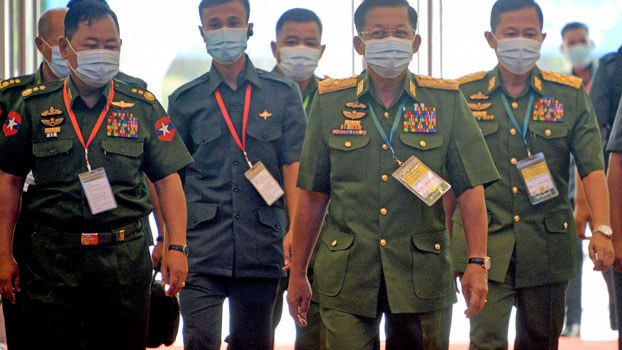North Korean doctors in Laos ordered to pay ‘loyalty funds’ to Pyongyang
North Korea is forcing two doctors who set up a highly profitable ward in a hospital in Laos to send their earnings back home as so-called “loyalty funds,” North Korean sources in Laos told RFA. The North Korean doctors, a physician and a surgeon, were dispatched to the Southeast Asian country to set up a practice on one floor of the Lao-Asean Hospital in the capital Vientiane, an upscale medical facility that offers a higher standard of care than an average Lao hospital. The hospital caters to wealthy foreigners who live in Laos, as well as tourists. Under the normal terms for North Korean workers dispatched to other countries, the doctors had to give their government a percentage of their earnings. In most cases, the money these workers keep is still several times what they could hope to earn at home. But the COVID-19 pandemic caused revenue at the hospital to decline, as there were fewer wealthy foreign patients. The ward operated by the North Korean doctors was forced to suspend operations until the Lao government lifted restrictions in May. As the money started rolling in, Pyongyang ordered the two doctors to resume payments, only in greater amounts that cut sharply into their incomes. “I heard from an acquaintance, who is close to the doctors from Pyongyang, that the North Korean authorities have demanded excessive loyalty funds from the doctors,” a North Korean source in Laos told RFA’s Korean Service on condition of anonymity for security reasons. “Their operations have barely become normalized. But they look particularly depressed and disappointed because they owe more in loyalty money than they earn,” she said. The doctors started their practice in Vientiane to capitalize on the tourism industry centered there. “Since there are many tourists, they expected that [opening a ward] in that hospital would be able to earn a lot of foreign currency,” said the source. “They designated [their ward] as [part of the] international hospital rather than a North Korean one,” she said. “Most foreign tourists and residents recognize it as [part of] an international hospital that offers better treatment than the local Lao hospitals, and they visit a lot.” Prices can be up to 10 times higher, and must be paid in U.S. dollars, cash only, according to the source. She said she was aware of a Chinese businessman who paid $20 for an abdominal pain diagnosis that would cost $2 in a typical Lao hospital. “Since May, the hospital has been making a good profit as the Lao government completely lifted the COVID-19 lockdown,” she said. Another North Korean in Laos said the hospital ward was established a few years ago, before the worst of the pandemic had reached Laos. “It was founded and operated by two doctors in their 40s who were dispatched from Pyongyang a few years ago. They diagnose, treat and perform surgeries on patients regardless of their nationalities, and get a lot in foreign currency,” she told RFA on condition of anonymity in order to speak freely. “The Lao government closed the border and banned movement between regions in 2020. As the entry and movement of foreigners was suspended, the North Korean hospital [ward] started seeing fewer patients,” the second source said. Eventually the ward had to suspend operations as the steady flow of patients dwindled. “The [ward] has emerged from operational difficulties caused by the COVID-19 crisis, and it is making significant profits,” she said. Sources told RFA that the North Korean ward is able to earn between $100 and $200 per day on average, but has been asked to send to Pyongyang $3,000 per month. After factoring in overhead, very little remains for the two doctors. An employee of the Lao-Asean hospital confirmed to RFA’s Lao Service that two North Korean doctors have been working at the hospital for the past two years, but could not elaborate on how they came to work for the hospital or what their exact positions were. A Lao health official, meanwhile, told RFA that the hospital is privately owned by a domestic company, Lao Medical Service Co., but that it was common for hospitals to hire doctors from abroad. “Many private hospitals in Laos employ many foreign doctors and medical experts including Chinese and Vietnamese because these foreigners have great knowledge in the field,” the official said. “As for the Lao-Asean Hospital, I know that the owner is a Lao investor who has hired several Chinese doctors to work with Lao counterparts and at least one of them is the head of a treatment department, but I don’t know whether the hospital has any North Korean doctors,” he said. Additional reporting by RFA Lao. Translated by Claire Lee, Leejin J. Chung and Max Avary. Written in English by Eugene Whong.


